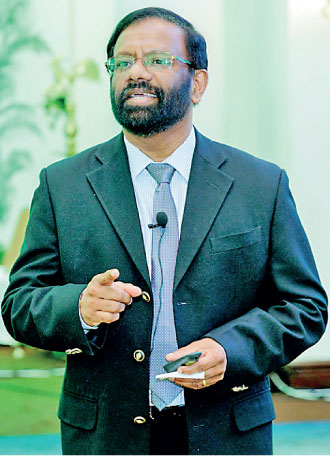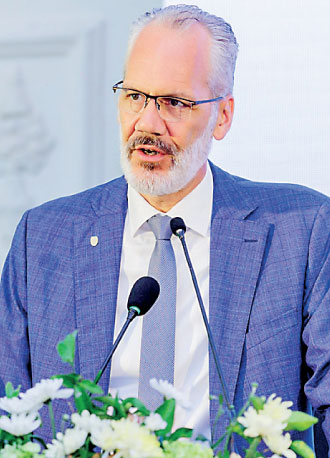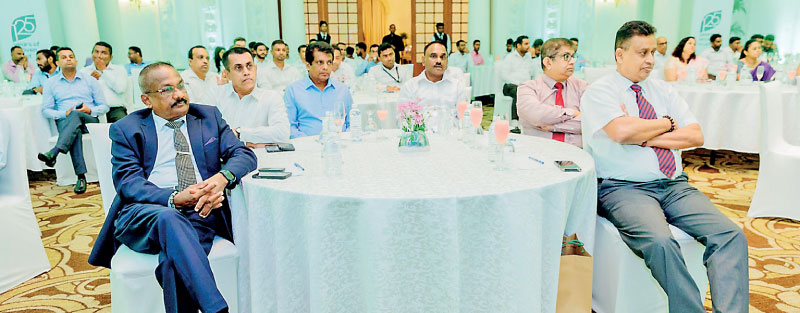Monday Feb 23, 2026
Monday Feb 23, 2026
Thursday, 12 September 2024 03:42 - - {{hitsCtrl.values.hits}}
 |
| University of Peradeniya Faculty of Agriculture Department of Crop Science Professor S.P. Nissanka sharing his insights |
 |
| Baurs CEO/Managing Director Rolf Blaser giving his opening speech
|
The urgent need for sustainable nitrogen management has never been more critical for Sri Lanka, as highlighted by recent findings on the environmental and economic impacts of nitrogen use in agriculture, stressed an insightful technical session on Super Urea, held by A. Baur & Co. Ltd., also known as Baurs, a name synonymous with the agriculture industry of Sri Lanka.
Held on 4 September at the Galle Face Hotel Colombo, the session saw two key experts taking centrestage – University of Peradeniya Faculty of Agriculture Department of Crop Science Prof. S.P. Nissanka and Innovar Ag LLC Vice President and former Kansas State University Precision Agriculture Assistant Professor Prof. Ray Asebedo.
Baurs CEO/Managing Director Rolf Blaser, Deputy MD/Director Agriculture Janaka Gunasekera, and senior management and staff were in attendance, including guest FAO Sri Lanka Senior Agriculture Specialist and former Director General of Agriculture Dr. W.M.W. Weerakoon.
Nitrogen, the most abundant element in the atmosphere, plays a crucial role in plant growth, but when mismanaged, it can lead to significant environmental challenges. In Sri Lanka, nitrogen emissions from agriculture have surged, contributing to soil degradation, water pollution, and greenhouse gas emissions. With less than 40% of nitrogen fertilisers being effectively utilised by crops, the remainder is lost to the environment, causing widespread harm.
In 2016, Baurs took the lead initiative to pioneer super urea, a nitrogen dual stabiliser to reduce both ammonia volatilisation and nitrification of nitrogen fertilisers in the soil. These stabilisers improve the efficiency of nitrogen fertiliser application, minimise nitrogen losses, and enhance crop yield while reducing environmental impact. Among its partnerships is Innovar Ag, with which Baurs has an exclusive distributorship in Sri Lanka.
Innovar Ag’s products like N-Yield and NBound significantly reduce nitrogen loss, minimise environmental impact, and increase crop yields by up to 22%. By leveraging proprietary technologies such as PENXCEL, Innovar Ag provides farmers with tools to enhance productivity while preserving the planet’s health.
Prof. Asebedo highlighted that, with a focus on combating nitrogen loss through mechanisms like ammonia volatilisation and nitrate leaching, Innovar Ag’s cutting-edge solutions ensure that more nitrogen reaches the plant, reducing harmful emissions and water contamination. Their suite of products, including NEON, a dual-action nitrogen stabiliser, demonstrate their commitment to creating sustainable agricultural practices that not only increase profitability but also contribute to a healthier environment.
Prof. Nissanka went onto stress the alarming rise in reactive nitrogen (Nr) compounds responsible for various environmental issues, including eutrophication, soil acidification, and the depletion of soil biodiversity. As the country ranks low on the Sustainable Nitrogen Management Index, there is a pressing need to adopt innovative approaches to nitrogen management. Using controlled-release nitrogen fertilisers (CRNFs), urease inhibitors, and nitrification inhibitors are highlighted as effective solutions to improve nitrogen use efficiency (NUE) and reduce nitrogen waste.
In response, the South Asian Nitrogen Hub (SANH) Research Program, supported by the UK Research and Innovation (UKRI), is leading efforts to enhance nitrogen management practices in Sri Lanka. The program focuses on testing genetic and agronomic solutions and the integration of traditional knowledge with modern science. Prof. Nissanka also emphasised the need for strong policy interventions to curb nitrogen pollution.
It calls for the development of a National Action Plan for Sustainable Nitrogen Management, which would involve a comprehensive approach to policymaking, integrating environmental stewardship, research, and extension services. With the right policies in place, Sri Lanka can achieve significant improvements in nitrogen management, leading to enhanced food security, better environmental outcomes, and a more sustainable future.
Regarded as a renowned scientific expert in the field of organic and sustainable agriculture in Sri Lanka, Baurs continues to actively engage in dialogues through its centre of excellence, together with diverse stakeholders with the support of leading research institutions and academia, to reduce nitrogen waste and to improve efficiency and ensure long-term agricultural productivity and resilience.

Section of the audience